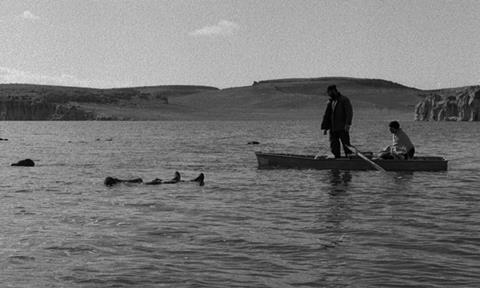In a dystopian future, a scientist sets out to save the genetically modified crops which sustain the surviving population

Dir. Semih Kaplanoğlu. Turkey, Germany, France, Sweden, Qatar. 2017. 127 mins
Director Semih Kaplanoğlu’s first feature since his 2010 Berlin Golden Bear winning drama Bal (Honey), Grain is a bold departure from the intimate tales of contemporary Turkey for which he is best known. A dystopian sci fi set in a post-apocalyptic future, it’s a visually arresting piece which, in its ominous langor and esoteric themes, has something in common with Tarkovsky’s Stalker. The impact of the film is slightly diluted however by opaque plotting and English dialogue which is somewhat over-masticated by some of the non-native English speaking cast.
A film which is never less than spectacular to look at
Star Jean-Marc Barr is just one of the strikingly handsome elements in a film which is never less than spectacular to look at. The combination of Giles Nuttgens’ precisely framed black and white photography and some genuinely impressive locations means that the look of this picture should be a key selling point. The themes - migration, climate change and food crises - are timely. But the narrative’s laboured philosophical elements and a protracted personal odyssey, not to mention an overstretched running time, might prove to be an obstacle outside of the adventurous arthouse and the festival circuit.
An uncompromising opening sequence sets the scene in this unspecified future. A shadowy corporation controls access to the few sectors of the planet where the climate is still relatively bearable and the scorched soil still fertile. Multi-ethnic migrants are corralled into wire mesh encampments reminiscent of those in Alfonso Cuaron’s Children Of Men. One by one, they are called in and genetically profiled. Only an elite few will make the grade and gain access to a city and its food sources, both of which are protected by a formidable electromagnetic wall.
A dispassionate tracking shot demonstrates what happens when a desperate migrant tries to breach the invisible force field. The shot sweeps past the smouldering corpse and into the wheat fields that he was trying to reach. There we meet Professor Erol Erin (Barr), brow furrowed as he realises that spontaneous, massive failure has hit the genetically modified crops on which the city depends. Everything created with synthetic biology is dying.
The plot device which triggers Erol’s quest is inserted, somewhat clumsily, into the story by having a corporation bigwig namedrop a maverick research scientist during a board meeting. Erol’s quest takes him through photogenic industrial blight - Detroit, Michigan provides several of the film’s bleakly devastated locations - and numerous oppressively framed concrete corridors. He soon discovers that the scientist, Cemil Akman (Ermin Bravo), has disappeared and was last heard of living between two zones outside the city confines: Untended Nature and the Dead Lands.
When Erol, having broken out through the magnetic force field, finally encounters Cemil, he finds, living in a tent next to a toxic swamp, a man who is part geneticist, part seer. Cemil specialises in ignoring perfectly reasonable questions and responding instead with an expression of mystical amusement. The journey he is about to embark upon is too challenging for Erol, he says, but Erol tags along anyway and, ultimately finds himself lugging sacks of soil up and down a hillside. Its an exhausting toil, the point of which is somewhat nebulous; a charge which could equally be levelled at the film itself.
Production company: Kaplan Film Production
International sales: Match Factory info@matchfactory.de
Producers: Semih Kaplanoğlu, Nadir Operli
Screenplay: Semih Kaplanoğlu, Leyla İpekçi
Cinematographer: Giles Nuttgens
Editor: Semih Kaplanoğlu, Osman Bayraktaroğlu, Ayhan Ergürsel
Production design: Naz Erayda
Sound:Jorg Kidrowski
Music: Mustafa Biber
Starring: Jean-Marc Barr, Ermin Bravo, Grigoriy Dobrygin, Cristina Flutur
























